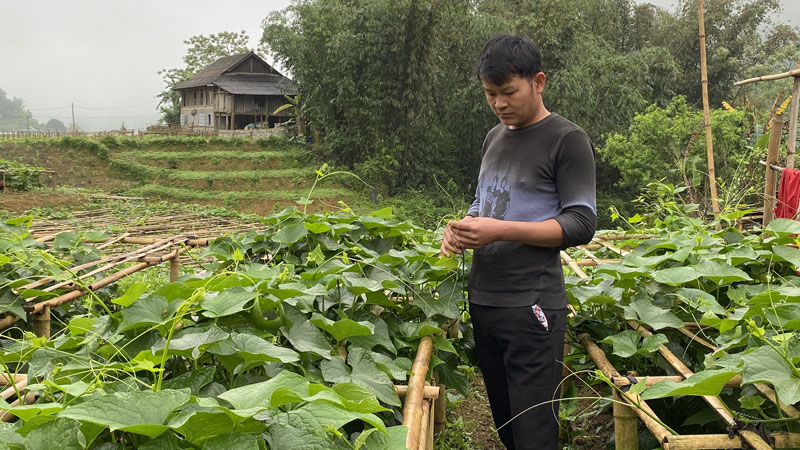
(HBO) - Taking advantage of its favourable soil and weather, Tan Lac district focuses on developing the cultivation of pomelo trees in low land areas along National Highway 12B and temperate vegetables in high land areas for improved economic benefits and living standards.
 Farmers in Tan Lac’s
Quyet Chien commune grow chayote for shoots and fruits, earning between 180 and
200 million VND per hectare.
Farmers in Tan Lac’s
Quyet Chien commune grow chayote for shoots and fruits, earning between 180 and
200 million VND per hectare.
The district has issued thematic resolutions to direct
locals to develop agricultural production in association with building
new-style rural areas. As a result, local communes and towns have switched from
rice to other crops with higher economic value on 2,500 hectares of land;
upgraded more than 670 hectares of gardens for the cultivation of pomelo trees,
watermelon, and peanut in low areas, and chayote and garlic in high areas,
among others.
Following the district Party Committee’s Resolution 10 on
promoting the cultivation of pomelo trees, the area under the citrus fruit has
expanded quickly. As of July 2020, the pomelo-cultivated areas hit 1,105 hectares,
with an average yield of 30 tonnes of fruit per ha. Each pomelo is sold for
20,000 VND, meaning a hectare of the fruit trees can reel in from 400 to 700
million VND. The fruit tree has become a key revenue earner for locals, many of
whom have invested in garden upgrade and intensive farming for better products
meeting increasing demand from the market.
In addition to pomelo, the district also prioritises
temperate vegetables, particularly chayote for its suitability for mountainous
communes’ soil and weather. The area under chayote is now around 90 hectares,
of which 65 hectares are in Quyet Chien.
Tan Lac pomelo and Quyet Chien chayote are popular
nationwide. The district has decided not to expand the plantation areas but
focusing on boosting productivity, quality, and safety.
The pomelo has been recognized as meeting the standard of
the One Commune One Product (OCOP) programme last year, while application for
provincial recognition of the chayote is pending./.
Mai Chau district has firmly established itself as a standout destination on Vietnam’s tourism map, attracting both domestic and international visitors with its breathtaking landscapes, rich ethnic culture, and warm hospitality. However, beyond its natural and cultural charm, a secure and well-managed tourism environment has added to Mai Chau’s appeal.
As Vietnam enters a new phase of economic and administrative reform in 2025, Hoa Binh province is stepping up its efforts to streamline governance, boost economic growth, and attract investment.
The Hoa Binh provincial People's Committee held its monthly meeting on March 26 to review the progress of key projects, assess budget revenue and public investment disbursement, provide feedback on draft documents for submission to the provincial Party Committee's Standing Board, and discuss other important matters related to the committee's governance activities.
Playing a key role in Hoa Binh province’s economic development, Luong Son district has been focusing on science and technology development, innovation, and digital transformation.
Identifying the application of online public services as a key step in administrative procedure reform and e-government building, Kim Boi district has proactively provided services and supported residents and businesses in accessing and utilising full-process online public services promptly and efficiently. The locality aims to lift the rate of end-to-end online public services to over 90%, with all officials and civil servants handling tasks in the digital environment.
Nguyen Anh Tuyet, hailing from a family steeped in the ancient art of herbal medicine, is transforming local medicinal herbs into high-value concentrated extracts, elevating their worth and healing potential.



 Farmers in Tan Lac’s
Quyet Chien commune grow chayote for shoots and fruits, earning between 180 and
200 million VND per hectare.
Farmers in Tan Lac’s
Quyet Chien commune grow chayote for shoots and fruits, earning between 180 and
200 million VND per hectare.